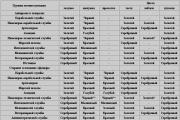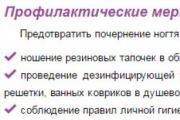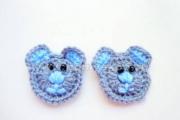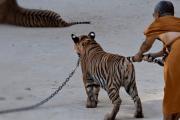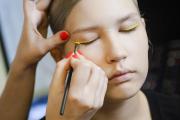Why does a child pinch and bite, what should parents do in this situation: reasons and advice from a psychologist. How to stop a child from biting: useful tips To prevent a child from biting
Parents eagerly await the eruption of the first teeth. Of course! The baby is growing by leaps and bounds, maturing. Unfortunately, changes are not always for the better. And this is natural. But what to do if you are quiet and calm child suddenly started biting mom and dad, fight, pull hair, pinch, in a word, go beyond the boundaries of what is permitted in every possible way. Don't panic, let's find out why child bites, then everything will immediately fall into place.
Why do children bite?
Basic cause such impudent behavior are emotions, which are characteristic of all people, even very small ones. Most often, children adopt manners and methods of emotional self-expression from their parents. In families where adults are calm and balanced and do not speak in raised voices, relationships are built on mutual respect and understanding. Therefore, it is unlikely that there will be a child bite.
By biting, a baby can express anger, jealousy or resentment. As a rule, children who bite are not independent; their parents decide a lot for them, punishing them for disobedience. The baby feels negative, so he shows his emotions in a similar way: starts to bite.
A bad emotional background makes children nervous. They are more susceptible to bad habits and, in addition to biting, often bite their nails and pick their nose. This is a kind of protest on the part of the baby, who does not yet know how to express his thoughts in words and uses the means available to him. Holding back emotions, in turn, can develop a mental condition called the “hyperactive child.”
 Biting happens to be provoked and positive emotions, such as joy, delight. Missing dad, the baby may bite him when he returns from work. The child is delighted, runs towards you, hugs you, and then suddenly bites your hand. It's just difficult for him to show his feelings in a different way.
Biting happens to be provoked and positive emotions, such as joy, delight. Missing dad, the baby may bite him when he returns from work. The child is delighted, runs towards you, hugs you, and then suddenly bites your hand. It's just difficult for him to show his feelings in a different way.
Look at yourself from the outside. Probably a child not enough your attention, and he tries to win him by all available means. Often, a mother is bitten during a long conversation on the phone, when the baby becomes bored and is exhausted from waiting.
Typical mistakes of parents:
- Try to fight back. Even a light bite demonstrates to the child that biting is not prohibited. After all, our children learn everything from US and imitate US. What is not allowed for a child is not allowed for a mother either.
- Pretend to cry. Often children perceive their mother's pretense as something like a game or performance, which is very exciting for the child. The baby will wait for the game to continue and repeat his actions in order to force his mother to show the “performance” again.
- Shame a child. The meaning of the words “Shame on you!” Due to his age, the baby is little understandable. He learns about shame much later.
Advice from psychologists:
— A change of activity will help relieve tension and nervousness. It is effective to alternate quiet activities (drawing or reading fairy tales) with sports games.
— Parents need to figure out when and under what circumstances a child bites most often. In the future, provoking situations should be avoided. Try to explain to your child that it is indecent to express your emotions in the company of normal people and aggressive behavior is unacceptable. Speak with confidence, in a calm tone, and, most importantly, regularly, so that the baby learns everything.
- As soon as a child hurts you, say “it hurts” or “I feel unpleasant.” Explain that this is not a game. The same applies to situations if the child fights. No need to shout and swear. Firmly, sharply grab your hand and make it impossible to strike. If after this the child raises his hand again, try to pull away. Explain that it is unpleasant for you when they do this to you. After such an attempt, you should not take the child in your arms, but you should not bring him to screaming and desperate crying. Just walk away, repeating that his behavior is unpleasant to you. For example, if you were playing together, pause the game and leave the room. Back up your words with action. And be sure to let the child understand that it is not he himself who is bad, but his action.
- Noticing that the child is moving towards another baby with the clear intention of biting, cover his mouth with your hand. This will prevent you from being bitten. Say firmly that “biting is bad and unacceptable.” The main thing is to act strictly and decisively so that the baby understands how ugly he is acting. In such situations, absolutely all family members must adhere to the same line of behavior, support each other, demonstrating to the child that such behavior is not approved.
— If a child still manages to bite another child, calm both of them down. Often the bite is so painful that the bitten child becomes hysterical and cries loudly. The offender also becomes frightened, and as a result both of them cry. After the children have calmed down, sit down in front of your baby, look him in the eyes and calmly say that “you should never bite people, it hurts and is unpleasant for them, and in general, that’s what food is for.”
- Do not push the child away if he bursts into tears, but hug him, take him in your arms, caress him and have pity. After all, your goal is not to offend and humiliate the child, but simply to explain that doing this is not good. Be consistent so that words do not diverge from deeds. Mom says - you can’t fight, pinch or bite - that means you can’t under any circumstances, anywhere and never. If you constantly adhere to this policy, then after a while the child will forget about this behavior.
Ways to stop a child from biting: 
- Calm moral conversation. When talking to your child, look him straight in the eyes. Sit down so that the communication turns out to be equal, and not condescending. Hug your baby and tell him quietly that you are unhappy with his actions, and not with him.
- You should not punish a child if he bites, as this only enhances the negative emotional connotation of the child’s behavior. He will stop biting, but the emotions driven deep will spill out at an older age and develop into new behavioral problems.
- Exercises that promote speech development and finger games will help correct a child’s behavior. Having learned to speak, the baby will be able to express everything in words, and the need for biting will disappear by itself.
- Much attention should be paid to nutrition. The “biters” diet includes vegetables and fruits, which must be chewed thoroughly. Carrots, turnips or apples are fine. Let the child bite his food better, then he will be less likely to bite people or animals. In addition, the chewing process is very beneficial for digestion, and also strengthens the facial muscles and accelerates speech development.
Many problems in education are caused, first of all, by age, the next stage in the development of the baby. As a rule, children bite at the age of 1-2 years. Competent behavior of adults, love for their child and patience can overcome any difficulties. Everything will pass
Did you like it? Click the button:
As soon as the baby has teeth, he finds a use for them, biting everyone and everything in his path. This phenomenon can be explained by the fact that the child will try a new sensation that was not available to him before and at the same time relieves the itching from teething.
But, as a rule, after one or two episodes of biting and the negative reaction of others to them, the baby learns that biting is not worth it and switches to less susceptible objects - rubber toys, teethers, etc.
It’s a completely different matter when the cause of bites in adulthood is an outburst of emotions - aggression, joy, boredom, hopelessness. How to stop a child from biting then? Child psychologists say that the solution to this problem lies in understanding the reason why the child bites and in the correct reaction of parents.
Why do children under one year old bite?
The reasons why children in the first year of life bite are obvious, firstly, with the appearance of the first teeth they feel discomfort and try to relieve it, biting almost everything. More often than others, the mother's breast becomes a victim of a bite during feeding. The first teeth, and these are the front incisors, are very sharp, and nature has decreed that if the baby clenches his jaws, then they can only be unclenched if he wants to. It is important at the time of such an incident not to scare the baby with your cry, since a bite on the delicate skin of the nipple can be very unpleasant and unexpected. There have been cases when a baby refused to breastfeed after his mother scared him with her scream during a bite.
To prevent this from happening, you can feed the baby using silicone nipple covers during the period of teething, or you can control the feeding process itself and monitor the baby’s reaction.
Sometimes children, even those who do not yet have teeth, clench their jaws forcefully during feeding when they fall asleep at the breast. A little older and smarter baby can bite his mother out of curiosity and observe the reaction. In this case, you should not delay the feeding process and wean your baby off the breast as soon as he loses interest in food.
A one-year-old child also bites because, not being able to speak, he thus shows his emotions or tries to attract attention to himself. Show your child that you are hurt and offended, but do not throw out aggression on the child, so as not to provoke a defensive reaction in him. Soon the baby will outgrow this period.
Reasons why children 1–3 years old bite
If a child bites at an older age, it is necessary to find out the reason for this behavior and react correctly to it.

Children come into this world without knowing the rules by which to live in society and learn very quickly, taking an example from others or remembering the reaction of adults to their behavior. As a rule, the lessons learned are stored in a little person for the rest of his life and form a model of his behavior in the future in certain situations. But Often kids don’t know how to express their feelings, do not know how to speak, are too shy, or too emotional communication is not accepted in the family. It is then that a bite becomes the only way to express oneself, to attract the attention of others. To understand the reasons that prompt a baby to bite, let's look at such episodes in more detail.
Joy, love, delight
Do parents often, when they see a chubby baby, feel the urge to pinch or bite him out of an overabundance of feelings? Perhaps someone does not restrain their desires or voice them. Small the child perceives such actions as an expression of strong feelings and sees nothing wrong with it and condemnatory. Some kids simply don’t know how else to express their positive emotions.
If you notice that your baby is in a positive mood, but is overexcited by active games or a joyful event, and the child bites, what should you do in this case? Firstly, you cannot shout and scold the baby, otherwise he will withdraw into himself and be afraid to show feelings.
Secondly, overexcitation of the nervous system at this age threatens neuroses and frequent episodes of headaches in the future, so you should not allow a state where the baby does not see or hear anything around. It is necessary to calm him down and take him to a quiet place, give him water to drink in small sips, and talk about abstract topics in a calm voice.
In the future, try not to tickle or pinch the baby, fooling around with him, in moments of tenderness - kiss the child or hug, showing how to show your emotions. And it would be a good idea to teach your child the exclamation “Hurray!”, so he can show delight and joy.
Aggression
Experiencing strong negative feelings, such as resentment, protest, disappointment, the baby still cannot control them, and often the only way out for the child to throw out all the aggression is to bite. At the same time a baby may bite not necessarily his offender, but a complete stranger who happens to be nearby at the moment of anger and, according to the child’s intuitive assessment, cannot fight back or express resistance.
The reason for this child’s behavior may be very strict discipline in the family, when the child is forbidden to show dissatisfaction and is punished for any disobedience.
Forced to restrain himself within the walls of the house, a child can throw out all the negativity, where nothing will happen to him for it, for example, on the playground with peers.
Another reason why a child bites and pinches, on the contrary, may be an overly emotional model of behavior in the family, when parents flare up with anger for any reason, the child also does not consider it necessary to restrain his emotions, while his perception of the world is adjusted through negativity.
How to properly respond to such an incident and how to stop a child from biting. To begin with, parents should think about their behavior and way of parenting. Perhaps it is necessary to give the baby more freedom so that such breakdowns do not occur, or if, on the contrary, communication occurs very emotionally, moderate your temperament, showing the baby how you can express your feelings differently. At the same time, it is necessary to show the child that the one he bit hurts and is just as offensive. There is no need to shame the child, this way you will achieve the effect of denying the bad deed; on the contrary, help him make amends for his guilt, let him take pity on the child he bitten, treat him with candy. The effect of showing mercy and realizing that “I am good” is much more effective than shaming the child and saying that he is bad. At one point, he may believe this and act with the caveat that he is really bad.

Why do children bite in kindergarten?
Did you find out that your affectionate and calm child in kindergarten bites, why does this happen and how to deal with it? First, you need to calmly talk with the child and find out how things went, and only then develop a strategy for educational work. There are many reasons why children bite, and they all revolve around one thing - the inability to control their emotions and express them in another way. But if the child started biting only when he went to kindergarten, the reasons may be somewhat different.
First of all, parents whose children began to bite in the garden begin to claim that the child came under bad influence; this has never happened before. Indeed, one of the reasons for this behavior may be a bad contagious example, if a child with problems with education or self-expression gets into the group and bites children, the rest do the same, since kids learn bad things faster than good things. And even a child who is not naturally aggressive can follow the lead of the crowd in order not to stand out. Only children who are self-confident, those who are praised a lot or talented children will always defend their opinion without being influenced by the majority.
If you notice that your child is biting, what should you do first? Identify the aggressor in the group and draw the attention of teachers and parents. Next, you can tell the children a fairy tale in which all the characters quarreled because they bit each other. Conduct a separate educational conversation with the baby, in which you explain that this is ugly, painful and unhygienic.
What to do if a child bites alone in a group and becomes a role model himself? The reason for this behavior, which was an unpleasant surprise for parents, may be to protect the baby. Perhaps the child is not confident in himself, does not have authority among his peers, and the only way to defend himself or his toy is to bite. In this case, you need to try to reconsider your way of communicating with the child, do not criticize him, give him the right to choose, and praise him more.
If a child bites for no reason or aggressively attacks children, what should you do? If in the first case the bite was a way of defense, then here there is a clear attack on the face. The reason for this may be pedagogical omissions imposed on the difficult character of the baby. Under such circumstances, you won’t be able to cope on your own, and even if the bites stop, other conflicts may arise, the instigator of which will be your child. The best solution would be to consult a child psychologist. At the same time, the child cannot be made an outcast; he must continue to go to preschool, and parents must become protection and help for the child, and not a “punitive commission.”
The baby begins to learn about the world “by the tooth”. All the toys, household items, and even mother’s fingers will be in the baby’s mouth until he learns to study the reality around him in other ways. But it happens that the baby does not give up his “bad” habit, even when he goes to kindergarten. How to stop a child from biting in such a situation?
When a baby bites
Infants tend to taste everything. This does not indicate that the baby is excessively angry or has nervous disorders. The most common causes of biting in infants under one year of age are listed below.
Causes of childhood bites
Children under one year old bite for a reason. There are many reasons why a baby tastes not only edible things, but also inedible ones.
- Teething is one of the most common causes of bites in children under one year of age.
- Emotional release. Little children bite when they want to say something to an adult. In other words, in this way they express closeness to their parents or, conversely, anger and irritation.
- Lack of awareness that the bite causes pain.
- The baby wants to eat and therefore may bite his mother’s hands.
Analyze the reasons given above. Are you paying enough attention to your baby? Do you always feed on time?
How to stop a child from biting before one year of age?
No way! If your baby is teething, then biting is the only way to scratch the swollen gums.
The only thing you can do in this case is to provide your baby up to a year with special items to relieve discomfort:
- a piece of carrot or apple;
- nibbler with a piece of frozen banana;
- hard steering wheel;
- teething toy.
If your baby bites his mother's breast during feeding, you can purchase special nipple shields or temporarily transfer the baby to bottle feeding. However, the second option is undesirable, as it leads to negative consequences (addiction to the bottle, decreased lactation).
If a child just decides to bite your hand or shoulder, immediately and strictly say “No!” and put on a stern expression on your face. The baby must understand that you do not like this behavior.
The most important advice that can be given to mothers of biting babies: be patient! Time will pass, and the teeth will no longer cause the baby so much discomfort. Then the habit of putting everything in your mouth and chewing will disappear by itself.


If an “adult” child bites
It is worth noting that the “biting period” does not always go away along with the discomfort caused by teething. Often children begin to bite at 1.5-2 years old and can continue to do this until kindergarten - up to 3-4 years. Of course, now the bites of the baby are not as harmless as in infancy. A mouth full of teeth and already quite strong jaws... You won’t envy the one into whom the baby decides to “sink his fangs.” Most often, the unfortunate victims are the child's parents and peers (for example, other children in kindergarten).
Causes of bites after a year
The reasons for such inappropriate behavior of a child lie in his psychological state. Behind the bites, as a rule, lies a child's self-doubt, fear, resentment, anger, and the desire to isolate himself from the world.
Most often, children begin to bite in whose families there is no harmony between adults, conflicts and scandals are frequent, the father screams and even raises his hand to the mother. Of course, in all these cases, consultation with an experienced psychologist is necessary.
However, relatively harmless factors may also be to blame for such a manifestation of feelings in a baby after a year:
- influence of other children in kindergarten;
- mild excitability of the child;
- lack of awareness that the bite causes pain.
It is simply necessary to wean your toddler from biting in kindergarten! Remember that behind this seemingly childish and even a little funny fun there is a serious danger. There have been cases when, after a child was bitten, stitches had to be applied.
If you notice such a “sin” in your baby, do not panic, remain calm and try to consistently eliminate the problem.
- Ask the teacher if there are other children in the group with similar behavior. It is quite possible that your child has fallen under the bad influence of his friends.
- Find out when your baby starts biting and what happens before this event. Also try to remember when you first noticed this bad habit in your baby. Maybe there was some turning point in the baby’s life.
- Talk to your child. Delicately and unobtrusively find out the reason why he “shows his teeth” so often.
- Explain that he is acting badly, that he is upsetting you, that his behavior is not at all like the behavior of an “adult.”
- Teach your baby that biting is not a way to express feelings. If he wants to show love, let him kiss and hug, if he is angry, let him say in words what does not suit him.
There are also a number of preventive measures you can take.
- Enroll your child in a self-defense class, a swimming pool or tennis - any place where the baby can move around and release pent-up energy.
- Create a favorable psychological atmosphere at home. The baby should not hear his parents swearing or see quarrels and scandals. Remember that a child copies the behavior of adults and it is up to you how he will behave in society.
- Be gentle and affectionate with your baby. Tell him how much you love him, kiss and hug your child.


Conclusion
The question of how to stop a child from biting arises quite often in families where the atmosphere is tense, quarrels are frequent and there is no mutual understanding between parents. Try not to swear in the presence of a child, be friendly and loving, and then the problem will disappear by itself.
There are several reasons why your child feels the urge to bite and they can be quite clearly summarized. For each age they are individual and similar. The fact that a child bites in the vast majority of cases is not some kind of mental disorder or lack of upbringing. Moreover, at an early age, this is one of the ways to understand the world around us, giving the child additional information about objects. Let's describe in more detail the age and reasons for this behavior of the baby:
Between 5 and 7 months of age, babies typically bite others when they feel discomfort around the mouth or when they have severe teething pain. This can also be one of the ways to understand the world around us. Most often it bites parents and relatives. At this age, the baby stops biting when he sees and hears the reaction of the person he bit. Give your baby who may be teething special teething rings that are designed specifically to reduce discomfort.
At the age of 8-14 months - when he is very excited. Most often he bites relatives or other children who are close to him. A firm “no” usually stops the biting habit. Tell them that biting hurts other people. Exaggerate the pain if a child bites you.
At the age of 15-36 months, surrounding out of irritation or because of the desire to control the actions of another person. They usually bite other children, less often - relatives. Children at this age stop biting as soon as they understand that such behavior is unacceptable. Help him learn to express his feelings in words.
After age 3, children usually bite when they feel helpless or scared, such as when they are losing a fight or when they think someone else might hurt them. Children over 3 years of age who bite frequently should be seen by a doctor. It may turn out that the child has health problems or a serious emotional state. However, sometimes biting is a manifestation of behavior problems associated with hostility and aggression.
Typically, a child's bite is harmless and does not require medical intervention to eliminate the consequences. Even bites that break the skin and start bleeding are not dangerous. It is enough to simply disinfect the bite site at home.
The reasons for children’s negative behavior are varied: at some point in their life, your child may begin to swing at family and friends, hit them in the face, pinch them, spit, and use swear words. He can behave in the same way towards younger brothers and sisters and peers. Of course, such behavior cannot be tolerated. Parents should analyze in what situations their child has aggressive outbursts, try to put themselves in the child’s place and understand what can cause them, and develop a general strategy for their behavior. In any case, it is important from the very beginning to prevent manifestations of aggression towards others.
It should also be remembered that young children do not have a sense of fear or understanding of the danger of their actions for themselves and others. A child can hurt another person because he does not yet know that biting, pushing, or hitting someone is just as painful as being bitten or hit by yourself.
Children learn from examples, primarily from their parents. If a family treats each other rudely, or children are physically punished, then there is a high probability that the child will learn these types of behavior. Analyze your relationships with family, friends and your child, and you will see that his behavior is a mirror reflection of what is happening in the family.
Aggression can be a reaction to lack of attention. The need for attention, kindness and support is the main need of young children. If you notice your child primarily when he is doing something negative, he will play pranks to get your attention. In this case, you should communicate with your baby more often, encouraging him when he behaves well towards adults and other children.
Aggression can also be caused by constant prohibitions that inhibit the child’s curiosity and natural activity, his desire for freedom and independence. Never stop your child from doing anything on his own.
Not only biting, but also waving arms and slapping the face can be caused by strong emotions in children. This happens more often in relation to peers, since children do not yet know how to communicate with each other. To correct this behavior, adults should organize children’s games together and teach them to express their experiences in words. In response to a child’s negative action, you need to take him away from the room or playground, explain to the child that someone else is hurting and feel sorry for the offended person. There is no need to often remind your child that he did not do well, as he may become even more irritable and begin to act out of spite.
Try to praise your child for good deeds, kind behavior towards others, in everyday life, show more attention to him and give him your affection more often.
As a child grows up, he actively begins to explore the world around him. This involves all the senses, including taste. Children often put various objects in their mouths, chew toys, objects, and even bite parents and other children. And in relation to bites, the most controversy often arises among parents and specialists. How to treat bites if the “victims” are parents, older children or other people’s kids on the playground, a toddler in kindergarten, is it possible to scold children when they bite after reaching the age of 1-2 years?
Why do children bite?
 Toddlers in the first two years of life often develop a bad habit - they bite their parents or other children. Such behavior can lead to conflicts on the playground or friction in the kindergarten group, and can also become an unpleasant fact for the parents themselves, who may suffer from children’s teeth.
Toddlers in the first two years of life often develop a bad habit - they bite their parents or other children. Such behavior can lead to conflicts on the playground or friction in the kindergarten group, and can also become an unpleasant fact for the parents themselves, who may suffer from children’s teeth.
Attempts at conversation often do not help in these cases, and corporal punishment is not a way out of the situation; often it can only provoke strengthening of the habit. What should you do in such situations, why do children develop this style of behavior, what does it indicate?
Experts identify several reasons for this behavior in children, ranging from physiological to emotional and mental disorders:
- physiological age period when the urge to bite arises. It is possible in children after 5-6 months of age, which is due to understandable circumstances. In children, their gums itch, which leads to swelling and discomfort. It can be alleviated by biting various objects, fingers in the mouth, mother's hands or breasts, teethers and anything else that comes to hand. This desire is at the level of instincts, and the child is usually not aware of his behavior. On average, the peak of such problems occurs in the period from 9-10 months to one and a half years, as most of the teeth erupt.
- emotional experiences in children after one year. The desire to bite in this period arises as a completely conscious act. The baby is still too small to express his problems and experiences in words, and at the same time he develops a whole palette of feelings towards others. Attempts to bite become especially aggravated during periods of stressful situations or experiences or vivid impressions. Then the child uses the most accessible of his “weapons” - his teeth - to let off steam and demonstrate his emotions.
- behavior patterns. At about one and a half to two years of age, children can react in this way to strong and traumatic situations. This could be a sudden change of environment, starting to attend kindergarten, moving to a new place, or the appearance of new members in the family. Due to this behavior, children usually probe the permissible boundaries and try to manipulate other people - children or adults. Often, a child’s attempts to bite in kindergarten are a kind of struggle for leadership, establishing their own rules in the team.
- mental disorders. In some cases, persistent attempts to bite, which do not disappear even after 2-3 years, may be one of the symptoms of mental pathologies. With such problems, children do not stop biting even in older preschool age. In such cases, advice from a neurologist and psychiatrist is necessary.
Children do not bite because it gives them pleasure, they are trying to convey to others the problems they have with their behavior. All babies try to bite, but for many, the word “impossible” quickly outlines the boundaries of what is permitted. If a child, knowing about the prohibitions, continues to do this, look for problems!
If a child also does this with negative emotions, rage or anger, the help of a psychologist may be needed; these can be very deep and traumatic situations and reasons.
Categories of children who often bite
Psychologists identify several categories of children who are more likely to bite than other categories of children:

What to do if a child bites?
 The ways to influence such dangerous behavior and bad habits largely depend on the reason why the child began to bite. If this is teething for an infant, you can use silicone teethers and rings that have coolants and pimples. They can be purchased at any pharmacy or store, selected by size and color. You can also use special gels for teething, having first discussed their use with your doctor.
The ways to influence such dangerous behavior and bad habits largely depend on the reason why the child began to bite. If this is teething for an infant, you can use silicone teethers and rings that have coolants and pimples. They can be purchased at any pharmacy or store, selected by size and color. You can also use special gels for teething, having first discussed their use with your doctor.
If a child bites while breastfeeding, biting the nipple, you need to immediately take the breast away from him and sternly tell him that it hurts the mother, so she will not feed further. This will quickly form the “biting-deprivation of food” reflex. Then attempts to bite while breastfeeding will stop quickly, since children are not their own enemies and do not want to remain hungry; feeding and the mother’s breast are important to them for comfort in life.
For older children, when biting, you need to increase the amount of physical activity and activity, engage the child in gymnastics or exercises, send the baby swimming, and engage in active games.
You need to have conversations with emotional children, explaining and driving home the idea that you need to show your emotions and feelings in a different way. It is important from a very early age to express any of your emotions with words or at least gestures, but not with bites. It is important to talk a lot with children and spend time with them.
If the chewing muscles are weak, to strengthen them and prevent biting, you need to occupy the child’s mouth and train the muscles with dense foods. It includes pieces of apple or carrot, a piece of beef. You can blow up balloons or blow soap bubbles.
In problem families, you need to resolve conflicts without the child, and try to behave correctly in front of him, setting a positive example. It is important to eliminate from the child’s life all negative factors that lead to stress and accumulation of aggression.
When do you need the help of a psychologist?
If parents are concerned about their child’s constant biting, and when he is over three years old and still bites, it is worth contacting a psychologist. It is also worth doing if various psychotraumatic situations occurred in the family or kindergarten or in the child’s team that affected the child’s behavior.
It is worth contacting specialists if a child bites and other oddities are found in his behavior, he is aggressive and cruel to others or to himself. It is also dangerous to display aggression towards toys if they are thrown and broken, towards animals or parents, if the child does not sleep well at night and cannot concentrate on activities. This may be signs of mental pathologies.
You cannot scold a child, beat him or punish him in any way until the parents understand the true causes of the problem. Often the child is not to blame for his behavior. You cannot bite the child back, as some “psychologists” advise, so that he feels the pain. This may be perceived as a game, and then the child will bite more often and harder. In addition, children follow the example of adults; if an adult bites back, then a child can do the same.
 The main task of parents is to stop bites in their child as quickly as possible. If this is a child over a year old who already behaves intelligently and bites, the correct behavior of the parents is important. The eye-to-eye eye contact technique works great. It is important to squat down after the bite so that the eye level of the parent and child is the same. It is important to make eye contact and not angrily, but firmly say that you should never do this with anyone. If the child tries to bite again, it is important to deprive him of eye contact, without looking at him and without paying the slightest attention, and to show with all his appearance that it is very unpleasant for the parents that the child bites.
The main task of parents is to stop bites in their child as quickly as possible. If this is a child over a year old who already behaves intelligently and bites, the correct behavior of the parents is important. The eye-to-eye eye contact technique works great. It is important to squat down after the bite so that the eye level of the parent and child is the same. It is important to make eye contact and not angrily, but firmly say that you should never do this with anyone. If the child tries to bite again, it is important to deprive him of eye contact, without looking at him and without paying the slightest attention, and to show with all his appearance that it is very unpleasant for the parents that the child bites.
It is necessary to tell the child that bites are painful, and if the child tries to manipulate parents through bites, which is often practiced by children under two years of age, such behavior must be stopped immediately so that the vicious practice does not become entrenched. This cannot be translated into a game or a joke; it is important to strictly say that this cannot be done. No agreements are allowed in the event of a child’s aggression.
For impressionable children who bite, the fact that their parents react negatively to the bites and imitate crying will be unpleasant. It is important that the child realizes his action, and feels sorry for the bitten parent, and understands that he hurt. It is important to describe to your child your feelings associated with the bites.
If a child bites in kindergarten but behaves quite adequately at home, it is worth discussing the reaction with the teachers. It is important to decide that the child is not punished or publicly shamed, scolded or put in a corner. This often backfires and results in protest behavior; children become more aggressive, trying to regain lost authority among their peers. It is important to stop bites, but do it in private - one on one.
When scolding a child, it is important to emphasize that the child’s action is condemned, but not the child himself; it is important to present compelling arguments and not stoop to a negative assessment of the child himself. The child himself is good and positive, but his habit of biting is bad and harmful.




